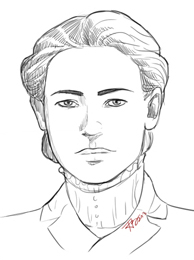Included below is a character analysis about Miss Sara Howard from the Alienist books. For basic information about Sara Howard, quotes made by Sara Howard, or character testimonials about Sara Howard, please use the menu.
Sara Howard Character Analysis
Sara Howard is a quite remarkable character. She chooses to remain unmarried, which for a woman of the nineteenth century is quite extraordinary, but even more extraordinary is her independence and belief in her own abilities, despite the constant discrimination against her. She graduated from college, and after spending a summer assisting a visiting nurse in the Tenth Ward, she went on to become a police secretary in the Police Department Headquarters at Mulberry Street with the hope of soon becoming the first female police officer in New York City. After finding that it would not truly be worth her while to remain in the police force, she instead opened her own private detective agency, where she currently works. Her professional achievements are therefore astonishing considering she is a woman of the nineteenth century; however, her character is not restricted to “the tough feminist” – she is in fact a quite complex character.
Childhood & Upbringing
Sara Howard was born and raised in New York. Her mother was an invalid, so it was her father, Stephen Hamilton Howard, who raised her as he would raise a boy (to learn more, see the history blog: The Education of Sara Howard). John Moore remarks that Mr. Howard taught his daughter to “ride, shoot, gamble, and drink with any Hudson Valley gentleman” (A 90). We know very little of her childhood, however we do know that she was quite free-spirited: Carr writes that she made the “decorous neighborhood” of Gramercy Park, where she grew up, into “her own private rumpus room” (A 41). There are also strong hints that Sara may have been sexually abused, either in childhood or at some point before the events in The Alienist occur. When, in The Alienist, Lucius Isaacson suggests that the murdered boy may have been sexually abused, John observes in Sara’s eyes, as he describes, “welling tears that she blinked away quickly” (A 147). A moment later she claims that the killer must be male, making a somewhat ambiguous remark:
“But I can tell you John – that’s a man’s work, back there. Any woman who would have killed the boy wouldn’t have…” She groped for words. “All that stabbing, binding, and poking… I’ll never understand it. But there’s no mistaking it, once you’ve… had the experience.” She chuckled once grimly. “And it always seems to begin with trust…”
This mysterious “experience” she mentions goes unexplained, as well as the comment about trust, but both point toward her having experienced some form of sexual abuse in the past. However, this is only speculative at this point.
Except for a general overview of her education and work, there is only one occurrence in Sara’s life before the events of The Alienist of which we are aware, and that is her father’s death in 1893. He died in a hunting accident, and according to John in The Alienist, most agreed it was suicide while Sara did not. John tells Kreizler that the event affected her so severely that she “spent some time in a sanatorium afterwards” (A 92). This is a quite surprising fact about Sara, given her strong personality, and suggests that there are even more facets to her character than we are currently aware. However, as of yet, this point has not been explored any further than John’s comment, so we are left to wonder.
Character & Personality
As already mentioned, Sara Howard’s most obvious trait is what John calls her “adventurous spirit” (A 78): she is incredibly brave and determined. This has probably been exaggerated by the social expectations she is up against; she is driven to prove that she is not the delicate lady that men have been taught to believe she should be and she often goes to extremes to demonstrate how tough she is. However, this extreme behavior is certainly justified given the situation of women in her time period as she explains in the following passage from The Angel of Darkness, 368-9:
“[…] the message girls get when they’re growing up – especially in corners of the world like this one – is that if you want to do something with your life other than raise children, not only will your road be difficult, but you’ll never really be a woman. You’ll be a female, of some indefinite and not very appealing type. […] I’ll probably always be that strange Sara Howard, the spinster detective lady – unless and until I have a family.”
Despite this situation, Sara is dedicated to her work. She does claim that she would perhaps like to raise a family one day — it is simply, as she explains to Stevie, “that I object to the notion that I won’t be whole until I do” (AoD 369).
Sara Howard is a highly excitable character; John remarks that “her nerves are strung like a piano wire” (A 92). While her anger in the face of men who underestimate her is understandable, and while comments such as “[…] the next man who uses the word ‘lady,’ in that context and in my presence, will be shitting from a new and artificially manufactured hole in his gut” (A 212) are fun to laugh at, there is no doubt that Sara is a highly sensitive character. This sensitivity, as well as the emotional fragility demonstrated by her time spent in a sanatorium, both point toward a weaker interior beneath her tough exterior however this part of her character has not yet been properly explored in the novels.
Sara is also quite emotionally perceptive. In The Alienist, she notices that Mary Palmer is in love with Dr. Kreizler while John is completely oblivious, but more notably, she picks up on Dr. Kreizler’s idiosyncrasies and notes quite early in the case that he, as she describes, seems to have “a personal stake in it” (A 160). She later remarks of Frances Blake, Dr. Kreizler’s prior fiancé, “perhaps she reminded him of someone” (A 191). This speculation from The Alienist turns out to be true in The Angel of Darkness when Dr. Kreizler tells Stevie that Frances Blake reminded him of his mother. She also remarks, “It’s more than just his reputation, and more than just scientific curiosity. It’s something old and deep. He’s a very deep man, your friend Dr. Kreizler” (A 191). Although this could potentially say as much about Dr. Kreizler as it says about Sara (i.e., that the effects of his childhood are noticeable in his behaviour), no one but her, to our knowledge, noticed this about him. She eventually develops the theory that Dr. Kreizler had an abusive father and, after hunting in police files, proves herself right.
Finally, Sara Howard has a deep determination to find the truth. When Dr. Kreizler leaves the investigation in The Alienist, it is Sara who pushes them to continue working. This determination does prompt her do odd things like, as mentioned above, to hunt through police files to find personal information on her friend’s childhood for no reason other than her own curiosity. However, it is what makes her such an excellent detective; Kreizler remarks at one point that “Sara seems to view everything around her as a test case on which to sharpen her detecting skills” (A 361).

